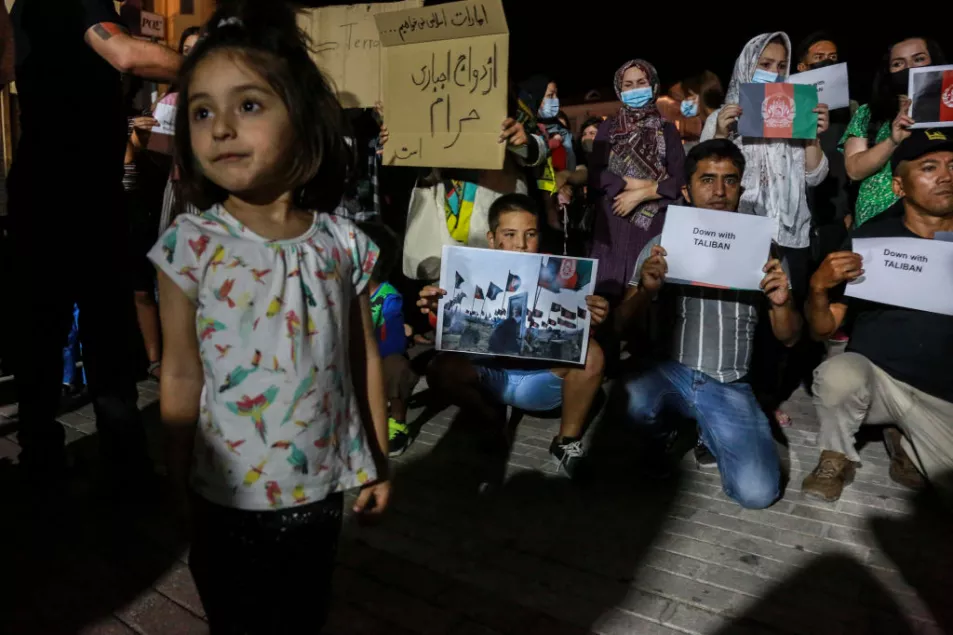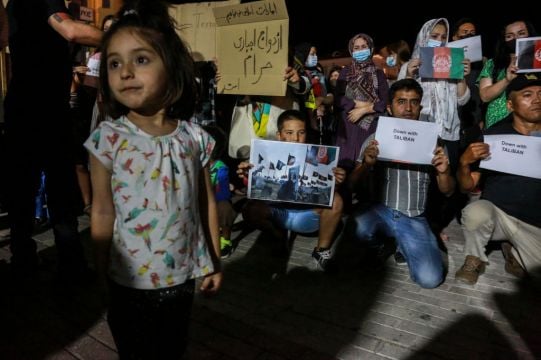An Irish MEP has described as “harrowing” the conditions at a refugee camp on the Greek island of Lesbos housing nearly 4,000 refugees, many of them from Afghanistan.
Fine Gael MEP Maria Walsh travelled to Lesbos on Thursday to hear of the plight of Afghan refugees and emergency workers trying to help them in overcrowded asylum facilities on the island.
Speaking from the island on Thursday evening, Ms Walsh told BreakingNews.ie: “Speaking with the International Rescue Committee (IRC), based off their figures they said its just under 70 per cent, speaking with the deputy of the camp they said its about 73 per cent, but in and around that number, so far though they’re not seeing reports of Afghanistan asylum seekers or refugees coming through the island in the last few weeks its more African refugees.”
However, Ms Walsh said they are expecting an influx of Afghan refugees displaced by the Taliban “very soon”, which will put even more pressure on the overstretched camp.
The Moria fire on the island devastated the camps in Lesbos last year, when there were closer to 13,000 refugees living there, and Ms Walsh said conditions have not improved since then.

“My first stop was to the camp to see first hand, a year after the Moria fires where the emergency accommodation was set up and was only meant to be short term and this has become a permanent structure.
“A lot of armed guards, a lot of what they call ISO boxes, but they’re essentially portacabins, eight people living in each. Larger tents with no air conditioning units.
“They have divvied the camp up into different sections; vulnerable groups, those with disabilities, mothers with young children, single women and younger men and more families to the back.
“I cannot tell you how harrowing it was, there are toilets that were portaloos, often people were locked in. Today I watched people washing themselves in the open air with buckets of water.
“Refugees and asylum seekers can’t leave the grounds unless they have approval to do so, usually that is for specialised medical appointments, meetings with a lawyer or mental health supports.
“It’s not as if close to 4,000 people can just walk off and enjoy the day in Lesbos, that can’t happen.”
Ms Walsh said she was particularly concerned with the lack of education available to young children, mental health supports and protection for those who fled countries due to persecution over their sexual orientation.
“In speaking to some of the groups and families throughout the day, young children are not in full-time education, overall it was a realisation of where we are in the world in relation to refugees and asylum seekers and how much more work we need to do, it can’t be just lip service.
“I came out here with a focus on seeing where we are a year on from the Moria fires and to see mental health supports on the ground and what more needs to be done, I was also looking at the LGBTQI space because there is a number of refugees, predominantly men, that are trying to find protection based off their sexual orientation but are doing it silently.
“I asked the deputy of the camp could he tell me how many LGBTQI individuals are there, and he said ‘we don’t have them here, they don’t exist’.
“This is over 3,500 people in a very small space, statistically there would have to be.”
I’ve just arrived in #Lesvos w/@RESCUE_EU to witness first-hand the critical humanitarian situation one year after the #Moria fires.
I'm particularly concerned about the ongoing mental health emergency there & the specific dangers faced by children.#NoMoreMorias 🇪🇺 pic.twitter.com/LqwGc0QNqKAdvertisement— Maria Walsh MEP (@MariaWalshEU) September 9, 2021
She believes the European Union and its members states need to do more to help refugees and asylum seekers.
“A year on from the fires I’m scratching my head and wondering have we become so desensitized to the life of refugees and asylum seekers when it’s not on our doorstep.
“There’s a lot more work to be done on putting pressure on the likes of the [European] Commission, my own government, other member states, MEPs, and even the Greek government because last winter it was a difficult time given the coldness, their proximity to the sea.
“They don’t have adequate bathrooms [refugees], connected plumbing systems or electricity across the entire camp so far, human waste is going into the sea off the island of Lesbos in 2021.”
Ms Walsh was full of praise for the work of the IRC in trying to improve conditions and education for refugees, however, she said it is “simply not enough”.
In 2021 refugees should at least have access to medical treatment on the ground.
The IRC expect more Afghans to arrive in Lesbos in the coming weeks and months.
Speaking to different individuals and families throughout the day, Ms Walsh heard plenty of difficult stories, but two stood out to her.
“I spoke to a young refugee today, he was 21, and he came from the Congo. His father died due to his political affiliations after a government change, he fled with his younger brother to the UK two months ago. He has epilepsy and a mental health condition, and he has to really fight for any support.
“He is just one of a small few, less than 100, that the likes of NGOs can support because they simply don’t have the resources.
“I also met a father of five today who has a bullet in his head, it’s been there for a long time, and he’s continuously denied treatment by doctors because he doesn’t have the adequate paper work to ensure that he could leave Lesbos for Athens. His youngest child is now presenting with a mental health condition, and he can’t leave now because his family needs him in the camp.
“You’re scratching your head thinking, in 2021 refugees should at least have access to medical treatment on the ground.”
She added: “Younger children are starved of creativity and development, there are no toys, there are no games, there were a couple of kids who had a football, but even that is rare.
“In years to come the ramifications of living in enclosed spaces for the first five or six years of their lives will be huge.”







